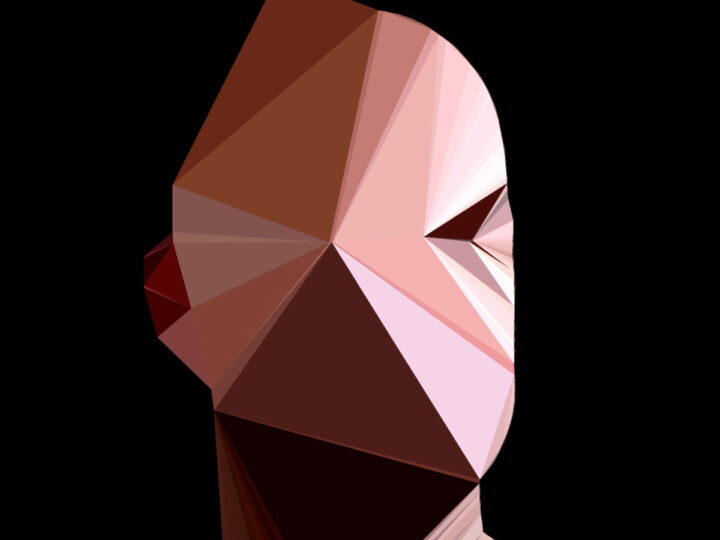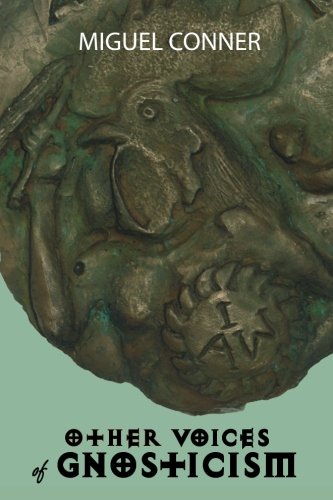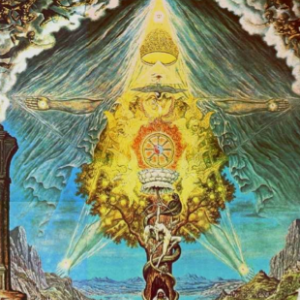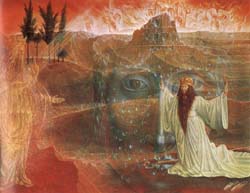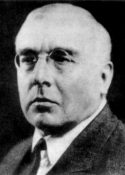
In Search of P.D. Ouspensky
Since the 2001 publication of Turn Off Your Mind, his prickly revisionist history of the dark side of the spiritual Sixties, former Blondie bassist Gary Lachman has become an increasingly prolific engine of literate, well-written, and clear-headed books about esoteric history and “occulture.” Having read his Steiner bio a couple months ago and enjoyed it, I just gobbled up his 2004 biography In Search of P.D. Ouspensky: The Genius in the Shadow of Gurdjieff. It is a great tale, very well told, and deeply sad, even as its ultimately depressing cast proved more illuminating than the usual wan bummers that lurk at the close of all biographies.
Like most folks, I first encountered the Gurdjieff work in Ouspensky’s posthumously published book, the unquestionably necessary In Search of the Miraculous. I also read the Russian mystic intellectual’s New Model of the Universe, at least the juicier bits about dreams and visions, and bought but never read and then sold his first book Tertium Organum, which Lachman says is a masterpiece of modern metaphysics, thereby making me feel like a goofball. But I never knew much about the guy outside of his scribal relationship with G., beyond the fact that he was an early and articulate writer on hypnogogia and lucid dreaming.
Lachman’s tale is fascinating, briskly told, and, as mentioned, informatively tragic. In Lachman’s telling, Ouspensky is a brilliant, romantic, creative metaphysical Russian who does very good work before meeting Gurdjieff, the Greek-Armenian trickster who he soon recognizes as the master of mysteries his heart has been yearning for since he glimpsed the higher planes during his early experiments with nitrous oxide and, possibly, hashish. Ouspenksy becomes G’s “number one,” traveling with him during the tumults of modern Russia and helping him set up the various incarnations of his esoteric school. Ouspensky has major doubts about his erratic, brilliant, dominating, and sometimes simply mean teacher, and so, after settling in Britain, more or less breaks with him in the 1920s. It is here that the story becomes, on a psycho-spiritual level, deeply interesting.
There are three obvious category of the sort of spiritual seekers who are drawn to esoteric schools: the student, the teacher, and the disenchanted. After fruitful or at least interesting years as a student, Ouspensky gets hung somewhere between teacher and disenchanted—a limbo hardly clarified by his teacher’s insistence that man is entirely asleep, a machine unable to awaken without, well, a teacher. Unable to stay with Gurdjieff, who was a harsh task master and a domineering personality, Ouspensky nonetheless stays with “the Work,” becoming a teacher in his own right, but losing—in Lachman’s well-supported view—the vivacity, friendliness, and romanticism of his earlier years, when his writings were the most creative, the most Ouspenskian. (After completing In Search of the Miraculous, Ouspenksy wrote nothing for decades and then croaked.) At the end of his life, the now thoroughly alcoholic Ouspensky shocks his students by finally and publicly repudiating the work, becoming, in his presentation to them, almost more of a “crazy wisdom” teacher than G. himself:
Every mention of the teaching, every remark about sleep, mechanicalness, self-remembering, every question couched in the jargon of the system was thrown back on the questioners with the absurd and unbelievable reply that Ouspensky had no teaching, that he had never taught them anything, and that, in any case, why should they believe anyone who told them they were mechanical?
For hard heads who have never heard the call of such schools, I suppose this final, tears-inducing peel of the onion is predictable. But if you are like Ouspensky, or Lachman (who practiced the Work for a while), or me (who went once to a Fourth Way group and was too lazy to go back), then Ouspensky’s final honesty is both beautiful, noble, and terribly sad.
Lachman tells a fascinating tale, but as with his Steiner bio, I wish Lachman had padded his narrative with some more analysis of the occult ideas themselves. A sympathetic critic of the mysteries, with both personal experience and disenchantment under his belt, Lachman approaches occult ideas with, to my mind, exactly the right attitude: a cultural one, which sees the occult operating at the junction of history, the arts, and consciousness. He doesn’t stretch these wings enough here for my tastes, though I understand the desire to keep that sort of philosophizing under control. I guess I should hightail it over to the his book, A Secret History of Consciousness.
In any case, I finished In Search of P.D. Ouspensky with a few nagging questions, particularly about Ouspensky’s ideas about time and recurrence, as well as the influence those ideas had on his student Maurice Nicoll, whose books on mystical Christianity, The Mark and The New Man, simply rock. In particular, I need to know more about the context of Nicoll’s Living Time, a mind-fucking book about recurrence that deja-vued my consciousness for weeks after I read it and, for that reason alone, remains one of my favorite twentieth-century books of esoterica. Still, I got a good dose of wisdom out of Lachman’s bio. The inward tragedy of Ouspensky’s life, his thwarted potential as a writer and independent spiritual thinker, is, for me, an instructive reminder about the sometimes hopeless double-blinds and psychological traps of the teacher-student relationship. I closed the book thinking about a “peer-to-peer” model that seems not only more appropriate to our times, but to the provisional, shifting, and poetic nature of spirituality itself. I suspect Lachman would agree.


